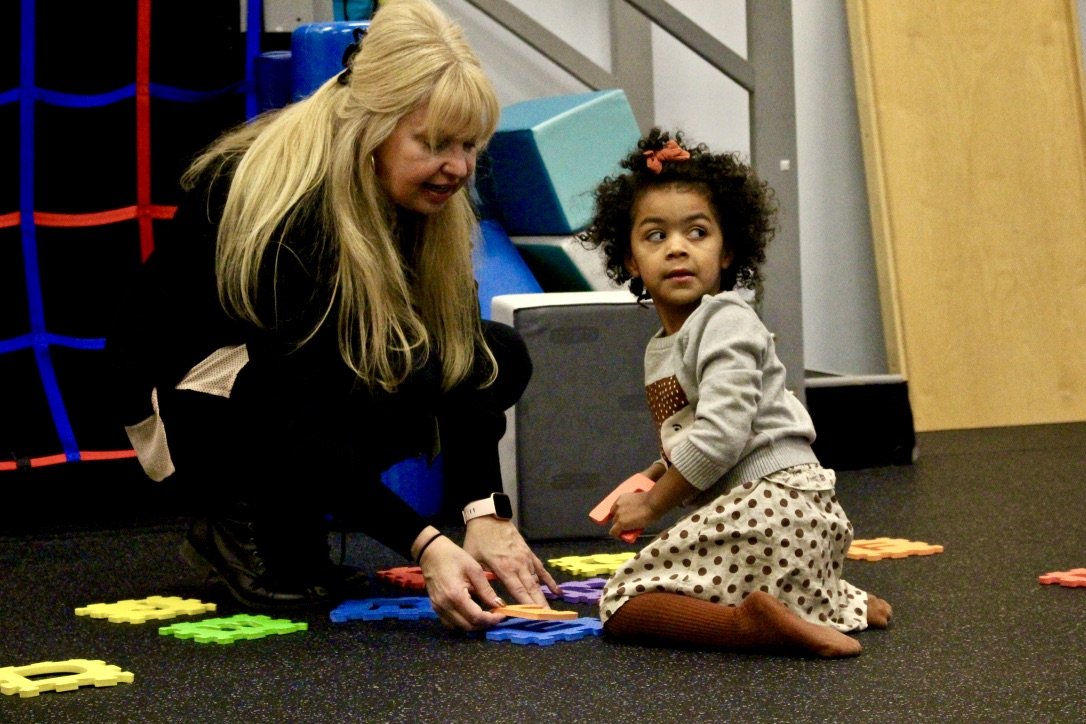
Using Peer-Mediated Intervention to Increase Social Participation
Children with Autism Spectrum Disorder (ASD) often have trouble with social interactions, like reading social cues, taking turns, making friends, and playing with others. Due to this, children with ASD have a more difficult time making and maintaining friends and being involved in social activities in school. To overcome this, it is important to increase social participation in authentic environments through programs such as peer groups.

Why Occupational Therapy By Itself Isn’t Enough to Build Social Skills
Social development is a crucial part of childhood. A lot of children that aren’t typically developing (and even many children who are typically developing) struggle with social cues and understanding different social interactions. Unfortunately, this is something that is difficult to address in one-on-one therapy.
Occupational therapy is important, and therapy itself should not be neglected. However, if the principles aren’t put into practice outside of therapy, improvement in behavior and social growth can be limited. It is very important for children to be involved in peer groups to build social and behavioral skills and to apply the skills learned during therapy.

Helping Families Support Feeding Therapy in the Home
Feeding is a central occupation that plays a critical role in an individual’s life. When a child has trouble eating, it is important to identify what might be causing those sensitivities. A child may be recommended for feeding services if they have difficulties such as selective eating, sensory issues surrounding food, and overall reduced acceptance of foods. These behaviors may cause malnourishment and weight loss in the child.

Helping Support Positive Eating Behaviors in Your Child
Feeding is a critical part of your child’s daily routine. It can be very frustrating when a child refuses to eat or has a meltdown every day around mealtimes. Feeding difficulties are prevalent in children with autism or those with sensory processing sensitivities. Sensory sensitivities can cause your child to have difficulty being exposed to foods because of their taste, smell, or texture. This can cause negative behaviors around meals.

What is the Peabody Test?
One of the most common tests used by both physical and occupational therapists is the Peabody. Although therapists typically refer to this assessment as the Peabody, the test is officially titled the Peabody Developmental Motor Scale-Second Edition (PDMS-2).

Outdoor Play in Occupational Therapy
In the past years, there has been a lot of advocating done to incorporate more physical activity in the schools to fight inactivity and childhood obesity. Incorporating therapy outdoors is another way to help include more physical activity in a child’s day.

The Importance of Outdoor Play
In this new age of technology, sometimes it is easy to forget how fun and important it is to be outdoors. Not only is it fun to play outside, but outdoor play provides a lot of opportunities for your child to learn important skills. With the warmer weather coming up, here is why outdoor play should not be forgotten!

Lego Therapy: Incorporating Social Skills Through Play
Social skills and participation is something that can be difficult to address in one-on-one therapy sessions but is a critical skill to teach when working with children. This is especially relevant for those children who are autistic. Lego Therapy and play-based clubs are a great way to incorporate teaching social skills.

Using Play for Learning and Development
Play and play-based therapy is a great way to teach your child crucial skills.
Play-based therapy is especially effective for teaching social participation skills to autistic children, but play can be modified to teach important skills in a way that your child is receptive to.
Play can serve a multitude of purposes depending on how the activity is presented to your child. Play can be more solitary, or it can be a method of social participation. Regardless of what type of play your child is engaged in, each format can be greatly beneficial for teaching new skills.

What are IEPs and ETRs?
IEPs and ETRs are common terms you might encounter, especially if your child needs speech, occupational, or physical therapy. In this guide, we will break down the basics of what each term refers to and provide some great resources if you’d like to dig deeper about the pieces and parts that make up IEPs and ETRs.

The Importance of Handwriting
Something commonly worked on in occupational therapy is handwriting. This might not seem like the most relevant fine motor area to address, but handwriting is still a very important skill. If a child struggles with their handwriting, it can cause problems in their eagerness and ability to learn.
Handwriting is a key skill that allows children to communicate what they learned or are thinking, and it allows them to keep up at school. Handwriting difficulties can cause anxiety, lack of motivation, and decreased academic performance.

Importance of Screening and Treating Visual Issues in Occupational Therapy
Visual-information processing is a critical component of learning.
This summary looks at the study titled “Vision, Visual-Information Processing, and Academic Performance Among Seventh-Grade Schoolchildren: A More Significant Relationship Than We Thought?” This study gives a good rationale as to why occupational therapists should be helping to screen and treat visual issues.

Why Every Child Needs Early Vision Screening
Vision plays a critical role in your child’s comfort and performance. We use our sight daily for numerous things, and if your child is struggling with their vision, it may cause more complicated issues down the line. Unfortunately, basic visual screening tests done by a pediatrician can miss a lot of common vision problems. Early intervention and awareness is one of the best tools to combat any problems that can be caused by vision issues.

The Importance of Evaluating Sleep as an Occupation
One of the most common and most overlooked issues in pediatric OT cases is sleep. It is a critical occupation that can affect a child’s performance, behavior, attention, sensitivity, and much more. The following studies provide evidence for why sleep should be evaluated when a child comes in for occupational therapy.

How to Help Your Child Fall Asleep
It is common to encounter some sort of sleeping issues when you are raising children. Luckily, most children do grow out of it as they reach adolescence. However, there are some cases, such as those children with autism or sensory processing disorders, where trouble sleeping is more long-term. Whatever the case may be, there are some approaches you and your family can take to make bedtime a bit easier on the whole family.

Occupational Therapy Techniques for Feeding and Toileting

What is Behavior Therapy for ADHD?

Create Confidence: the Importance of Self-Esteem in Young Children
When a child feels confident, they feel like they can take on the world. OT,PT, and Speech are geared towards helping build independence and confidence by helping your child build on the skillsets they need to thrive in life. These could be motor skills, communication, behavior, and more.

What is the Difference Between Fine Motor and Gross Motor Skills?
Motor skills, which are involved in the muscle movement within a child’s body, are divided into two categories: fine motor and gross motor. All motor skills require the necessary strength, coordination, and planning skills in order to be effective. There are many factors that contribute to the development of motor skills. What’s the difference between the two and what role do they play in your child’s development? Keep reading to find out!

Why Would My Child Need Occupational Therapy?
A child’s daily activities can be broken down into tasks or “occupations.” These occupations are where occupational therapy comes in. As your child develops, they may struggle with some occupations for a variety of different reasons. Occupational therapists can evaluate and help to address the many psychological, social, and environmental factors that impact the way a child interprets and interacts with the world around them.
